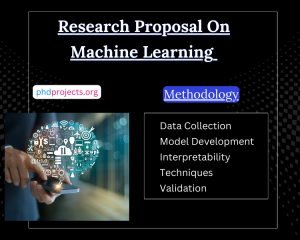Research Proposal on Machine Learning
In the domain of machine learning, developing a research proposal that essentially demands the sharpness, shortness and captivating disputes for the benefits of the research. Our commitment is to guarantee that every phase is executed with accuracy, coherence, and academic excellence. Any uncertainties regarding ML will be addressed by our dedicated help desk team. Share with us all your needs for more assistance.
Here, we provide the model template of a research proposal that suits for the particular project,
Title:
Enhancing Interpretability in Deep Learning Models for Medical Diagnostic Imaging
Abstract:
The main objective of this proposal is approaching the obstacles that are illustratable in deep learning models which are utilized in medical diagnostic imaging. In spite of their performance, the “black box” nature of these models slows down the clinical assumption. A research project is proposed by us that creates and tests new techniques of model understanding to enhance loyalty and clarity in AI (Artificial Intelligence) assisted diagnostics.
Introduction:
- Background: Through this, we elaborately depict the current state of AI in medical imaging.
- Problem Statement: The specified problem of insights is must highlighted.
- Research Significance: The significance of research for the domain and its future impact on healthcare is depicted here.
Literature Review:
- Current Approaches: We sum-up the existing understanding techniques in deep learning.
- Limitations: The latest method limitations are conserved among us.
- Research Gap: Detecting the gap that our research work towards to fill that place ,
Objectives:
- Primary Objective: A new understanding framework is created by us for deep learning models in observing images.
- Secondary Objectives: Validating the structure with medical experts and making sure that the insights are line-up with clinical reasoning.
Methodology:
- Data Collection: Sketch the kinds of medical imaging data that is essential and the moral deliberation for its own use.
- Model Development: This defines the kinds of deep learning models which we expect to occupy or improve.
- Interpretability Techniques: We explain the understanding techniques such as saliency maps, layer-wise relevance propagation that we decide to execute or enhance.
- Validation: Illustrate the process for validating the clarification of our models with the experts in the healthcare field.
Expected Outcomes and Significance :
- An understandable deep learning model is generated by us for applying on the particular diagnostic imaging like MRI and CT scans.
- The model decisions must undergo quantitative and qualitative analysis and are associated with medical professionals.
- Finally, our research papers are sending to the top-ranking seminars and magazines.
Timeline:
- We allocate the accurate timeline of the project event.
Budget:
- The budget is efficiently required that includes our purchased data, analytical resources and manpower are must be explained in detail.
Conclusion:
- Outline the predicted improvement of the research to machine learning and health care.
References:
- Indicate the main objective of literature that leverages our proposal.
It is the extensive model and the specifications are dissimilar from each other that are highly based on the nature of the research, the academy conditions and the sponsor’s body guidelines. Our proposal is designed to the audience who reads, if they are the partners of the sponsor committee, institution manager or teammates.

PhD & MS Research Proposals in Machine Learning
Crafting research proposals for PhD and MS studies in Machine Learning can be quite challenging. With over 17 years of expertise in this field, we have successfully delivered over 8000 ML projects. The following Machine Learning topics have been recently explored by our team. For additional technical support, please visit phdprojects.org. Feel free to reach out with your queries for further guidance.
- Detection of DDoS Attacks using Semi-Supervised based Machine Learning Approaches
- An Approach for Detecting Frauds in E-Commerce Transactions using Machine Learning Techniques
- Intrusion Detection using Machine Learning Techniques: An exhaustive review
- Machine Learning-based Improvement in Quality of Learning using 4Q & S Approach
- CLARA: Cloud Learning Autonomous Reacting Algorithms, a Machine Learning Service for the Internet of Things
- Importance of including practical machine learning application in the universities’ curriculum
- Detection of Social Media Hashtag Hijacking Using Dictionary-based and Machine Learning Methods
- Application of Machine Learning for Analysis of Static Eccentricity Fault in IPMSM using Finite Element Method
- Machine Learning based Design Optimization of a GPS Antenna on a flexible substrate
- Approximation of Hardware Accelerators driven by Machine-Learning Models : (Embedded Tutorial)
- Approximate leave-one-out error estimation for learning with smooth, strictly convex margin loss functions
- EEG-based emotion recognition with manifold regularized extreme learning machine
- Design and Implementation of Machine Learning Evaluation Metrics on HPCC Systems
- Electrical Faults-Detection and Classification using Machine Learning
- Domain Classification of Textual Conversation Using Machine Learning Approach
- Tool Wear Monitoring Using Machine Learning
- EEG mental arithmetic task levels classification using machine learning and deep learning algorithms
- A Review of Machine Learning Methodologies for Network Intrusion Detection
- Real time-Employee Emotion Detection system (RtEED) using Machine Learning
- A Performance Comparison Of Spectrum Sensing Exploiting Machine Learning Algorithms